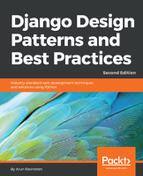Abstract inheritance is an elegant solution which uses special Abstract base classes to share data and behavior among models. When you define an abstract base class in Django, which are not the same as abstract base classes (ABCs) in Python, it does not create any corresponding table in the database. Instead, these fields are created in the derived non-abstract classes.
Accessing abstract base class fields doesn't need a JOIN statement. The resulting tables are also self-contained with managed fields. Due to these advantages, most Django projects use abstract base classes to implement common fields or methods.
Limitations of abstract models are as follows:
- They cannot have a Foreign key or many-to-many field from another model
- They cannot be instantiated or saved
- They cannot be directly used in a query since it doesn't have a manager
Here is how the post and comment classes can be initially designed with an abstract base class:
class Postable(models.Model):
created = models.DateTimeField(auto_now_add=True)
modified = models.DateTimeField(auto_now=True)
message = models.TextField(max_length=500)
class Meta:
abstract = True
class Post(Postable):
...
class Comment(Postable):
...
To turn a model into an abstract base class, you will need to mention abstract = True in its inner Meta class. Here, Postable is an abstract base class. However, it is not very reusable.
In fact, if there was a class that had just the created and modified field, then we can reuse that timestamp functionality in nearly any model needing a timestamp. In such cases, we usually define a model mixin.
